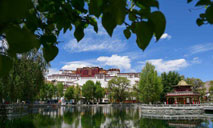Harmonious Xinjiang -- Uyghur youth tells real lives of ethnic minority people in China
TOKYO, May 1 (Xinhua) -- To introduce the real lives of local people in northwest China's Xinjiang Uyghur Autonomous Region, Pardin Pahti, a Uyghur youth who now lives in Japan gave a speech on Thursday, offering a glimpse into the harmonious lives of all ethnic groups there.
Pardin, who grew up in Urumqi, the capital city of Xinjiang, talked about education, cultural inheritance and ethnic integration of the Uyghur people by showing photos and videos to nearly 200 Chinese and Japanese participants both online and offline.
In China, many high schools and universities have enrollment quotas and scholarships especially for Uyghur students, said the young man, and all these schools have halal canteens.
Meanwhile, the Uyghur language and culture have been protected and passed on in Xinjiang, he said. Thanks to the government's efforts, the traditional music of the Uyghur ethnic group, Twelve Muqam, has been inscribed on the World Intangible Cultural Heritage List.
When talking about the integration of ethnic groups in Xinjiang, Pardin said that in the process of living together, there has been a lot of integration of different ethnic groups in terms of diet, clothing, language and living habits.
"Onions are called 'Piyazi' in Xinjiang, which comes from the Uyghur language. Sports such as football and basketball are popular among people of all ethnic groups in Xinjiang," he said in the speech.
"People of all ethnic groups in Xinjiang hope that we will live a harmonious and peaceful life," he said. "We don't want to see any more terrorist incidents."
During the speech, Pardin refuted rumors such as Uyghur people could not contact relatives and friends in Xinjiang or could not re-enter Japan after returning to China.
Meanwhile, he invited Japanese friends to visit Xinjiang when the COVID-19 outbreak is over to see by themselves the real lives of people in Xinjiang.
After listening to the speech, Satoshi Tomisaka, a professor at Japan's Takushoku University said the Western media often report the Xinjiang issue with preoccupation or stereotypes, and some of them even deliberately use "labeling" for sensationalism.
Tomisaka said Pardin provided a large amount of first-hand information about the local lives in Xinjiang, offering a dimension different from that of the Western media, which is of positive significance.
Zhu Jianrong, a professor at Toyo Gakuen University of Japan, said some developed countries in Europe have prejudices against China. Hyping up the Xinjiang issue is a stigmatizing tactic by the United States to contain China's development.
It is convincing of the local Uyghur people in Xinjiang to tell their own experiences, said the professor. He hoped that more Japanese people can make independent judgment and go to Xinjiang to see for themselves.
Photos
Related Stories
- "Forced labor" in Xinjiang a false assertion: Xinjiang official
- China's Xinjiang fully guarantees ethnic minority students' rights to learn own languages: report
- "Karakax list" fabricated by "East Turkistan" members: report
- Report rejects "internment camps" fabrication by Adrian Zenz
- Report refutes false claim of "forced boarding" in China's Xinjiang
Copyright © 2021 People's Daily Online. All Rights Reserved.










